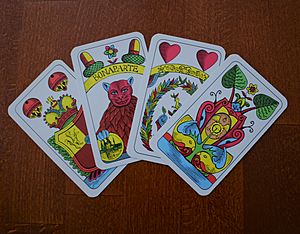Bohemian Schneider facts for kids
| "A nice little two-hander from central Europe." | |

The 20 'honours' in Bohemian Schneider
|
|
| Origin | Bohemia |
|---|---|
| Type | Plain-trick |
| Players | 2 |
| Age range | 8+ |
| Cards | 32 |
| Deck | German Skat or French pack |
| Play | Alternate |
| Card rank (highest to lowest) | D K O U 10 9 8 7 |
| Playing time | 7 minutes/hand |
| Related games | |
| Elfern | |
Bohemian Schneider is a fun card game for two players. It is played with a 32-card deck, usually a German-suited Skat pack. This game is a simple trick-taking game, which means players try to win rounds (called "tricks") by playing the best card. Because it is easy to learn, it is often played by kids aged 8 and up. The game likely started in Bohemia (now part of the Czech Republic) and then became popular in southern Germany and Austria.
Contents
How to Play Bohemian Schneider
Bohemian Schneider uses a 32-card deck. You can use either a German-suited deck or a French-suited deck (like the ones used for Poker).
Card Ranks
In a German deck, the cards rank from highest to lowest:
- Deuce (which is like an Ace)
- King
- Ober (like a Queen)
- Unter (like a Jack)
- Then the number cards: 10, 9, 8, 7
If you use a French deck, the ranks are:
- Ace
- King
- Queen
- Jack
- Then the number cards: 10, 9, 8, 7
There are no special "trump cards" in this game.
Starting the Game
First, shuffle the cards well. Each player gets six cards, dealt in two groups of three cards. The rest of the cards are placed face down on the table. This pile is called the "talon."
The player who is not the dealer starts the game. They play one card from their hand onto the table.
Winning Tricks
The other player (the dealer) then tries to win the "trick." To win, they must play a card of the same suit that is higher than the card played by the first player. For example, if the first player plays a 7 of Leaves, the second player needs to play a higher Leaves card, like an 8 of Leaves or an Ober of Leaves.
- If you win the trick, you collect both cards.
- You do not have to play a card of the same suit if you do not want to.
- You also do not have to win the trick, even if you have a card that could win it.
The player who wins the trick gets to start the next trick. After each trick, both players draw one card from the talon. The player who won the trick draws their card first. The game continues until all the cards from the talon and players' hands have been played.
Scoring Points
After all the cards are played, you count your points. You do not count the usual card points (like 10 for a 10, 4 for a King). Instead, you count how many "counting cards" you have won.
The counting cards are:
- Deuces/Aces
- Kings
- Obers/Queens
- Unters/Jacks
- Tens
There are 20 counting cards in total in the whole deck.
Here is how you score:
- Simple Win: If you win 11 or more counting cards, you get a "simple win."
- Double Win (Schneider): If you win 16 or more counting cards, and your opponent has won fewer than 11, you have made your opponent "Schneider." This means you win double points!
- Triple Win (Schwarz): If you win all 20 counting cards, and your opponent has won zero, your opponent is "Schwarz." This means you win triple points!
You can keep track of scores over several rounds or a set amount of time.
Game Strategy
In Bohemian Schneider, each card can only be beaten by a specific higher card of the same suit. This means it is important to pay attention to which cards have already been played.
- If you have a high card (like a King or an Ace), it is safe to play it if the only card that can beat it has already been played.
- When it is your turn to play a card to someone else's trick, try to get rid of cards that are not very useful. For example, play a low card if you know the higher cards of that suit have already been played.
The dealer changes each game. This makes sure that both players get a chance to go first, which can be an advantage.
Game Variations
Sometimes, people play Bohemian Schneider with slightly different rules:
- Any Higher Card: Some players allow a card to be beaten by any higher card of the same suit, not just the very next one. If you play this way, you must always play a card of the same suit if you have one. If you do not have the right suit, you can play any card.
- Any Suit: Another way to play is to allow a card to be beaten by the next higher card of any suit.
- Ace and Seven: In some games, the Ace can be beaten by the 7 of the same suit.
- Point Scoring: You can also score 1 point for each counting card you win.
- Winning 11-15 counting cards gives you 1 game point.
- Winning 16-19 counting cards gives you 2 game points.
- Winning all 20 counting cards gives you 3 game points.
Images for kids





